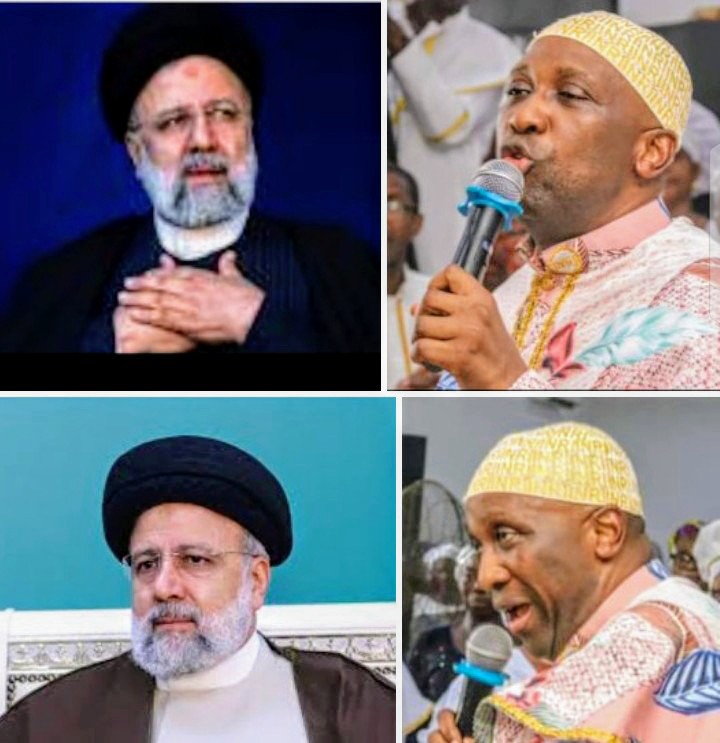By Kehinde KOLAWOLE

In a recent interview with PUNCH Newspapers, Primate Ayodele shared an intriguing aspect of his prophetic work. He confessed that he often prays for his predictions, particularly those perceived as ominous, not to materialize. According to Ayodele, prophecies inherently lack moral categorization—they are neither good nor bad, but simply revelations of what is to come. Despite this, the weight of potentially adverse outcomes compels him to seek divine intervention, hoping to alter the course of events for the better.
Primate Ayodele, known for his prophetic insights, fervently prays that his grim visions do not come to pass, especially the tragic demise of Iranian President Ebrahim Raisi. His deep concern for the potential fulfillment of such prophecies underscores the weight and seriousness with which he approaches his spiritual foresight.
As a vessel of God, he carries the heavy burden of delivering divine revelations to people worldwide. Despite the challenges of conveying prophecies that humans often perceive as ‘bad,’ his duty remains clear. A prophet must faithfully deliver the messages he receives from God, regardless of how they are received by those who hear them.
During his annual press conference, Primate Ayodele was asked by a journalist why he doesn’t celebrate when his prophecies come true. He responded thoughtfully, explaining that he doesn’t find joy in the fulfillment of his predictions. Instead, he feels a sense of sorrow because people often dismiss prophetic revelations with indifference. Rather than celebrating his accurate prophecies, Primate Ayodele prefers to pray that people will listen more attentively to the words of God and heed the divine guidance offered through these revelations.
Primate Ayodele’s grief is palpable following the unexpected death of President Ebrahim Raisi. His sorrow is not borne of personal connection but of forewarning: in 2023, Ayodele had predicted that a significant global leader would pass away in 2024. Now, as the world reacts to Raisi’s sudden demise, Ayodele’s prophecy looms large, adding a poignant layer to the tragedy.
In a tragic turn of events, Iranian President Ebrahim Raisi, along with the country’s foreign minister and several other officials, were discovered dead following a helicopter crash in a remote, fog-covered mountainous region in northwest Iran. After an exhaustive search that spanned several hours, rescue teams located the wreckage and confirmed the devastating loss. The 63-year-old Raisi’s untimely death has sent shockwaves through the nation, marking a dark chapter in Iran’s history.
State TV did not immediately provide a cause for the crash in Iran’s East Azerbaijan province. Among those on board with President Raisi were Iran’s Foreign Minister Hossein Amirabdollahian, the province’s governor, and several other officials and bodyguards, according to the state-run IRNA news agency. The sudden incident has cast a shadow over the region, raising questions and concerns as authorities begin their investigation into the tragic event.
In a striking proclamation captured in a video dated November 5, 2023, Primate Ayodele forewarned the world of a significant loss on the horizon: the death of a prominent president in 2024. His prediction has since stirred global attention, sparking curiosity and concern about which world leader’s fate might be entwined with this ominous prophecy
In his extensive 90-page compendium of prophecies for 2024, released in December 2023, Primate Ayodele issued a grave call to prayer. He forewarned of the impending death of a sitting president within the year, urging the global community to unite in spiritual intercession to avert the foreseen tragedy.
These were his words:
‘’The spirit of God says we must rebuke another outbreak of CoronaVirus and Ebola Virus in Africa and some other parts of the world. Let us pray not to record the death of a onetime Prime Minister, a sitting Prime Minister, a sitting President and a former President in the world.’’
Many may be wondering why Primate Ayodele didn’t specifically mention the name of President Ebrahim Raisi in his prophecies but people must know that all prophecies of God-inspired and an addition or subtraction from them would be disobedience to God’s instruction; if God allows you to mention names, you can but if he doesn’t allow you, refrain from mentioning names.
It would be recalled that in the interview with Punch Newspaper, Primate Ayodele explained why he sometimes mentions names of individuals in his prophecies and why sometimes, he doesn’t.
‘’ So when I say pray against the death of traditional rulers, is it not a good recommendation? When God says I should mention a name, I do, and when he doesn’t instruct me to mention a name I don’t because I’m not in charge of the prophecy. Sometimes when I mention names people still say I am fake, maybe because the person is old; so I am not saying anything to satisfy anybody.’’
‘’I’m the first to say that King Charles will have an ailment and I mentioned his name based on instructions, Sometimes God will instruct me to keep the prophecy but contact the person and tell him/her to pray.’’
‘’I love my critics because they make me more prepared; I started talking to journalists in 1994 and my first prophecy was published in Lagos Weekend Times when I said the Super Eagles would win Tunis 1994 and it is on record. So, is it now that I will say I’m afraid to say specifically what would happen?’’
In conclusion however, When a prophet forewarns of impending danger, it’s crucial for the entire community to unite in prayer. Ignoring these warnings can lead to unforeseen and potentially catastrophic events. Therefore, heed the prophet’s words, for in unity and faith lies protection against the unexpected.









